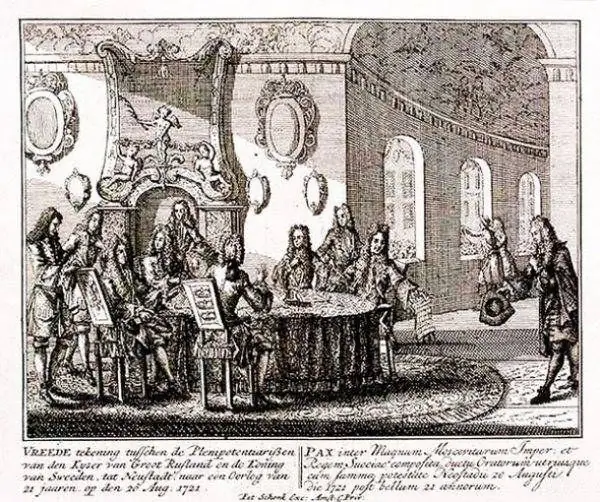- Author Antonio Harrison harrison@cultureoeuvre.com.
- Public 2023-12-16 07:44.
- Last modified 2025-01-22 21:44.
All the events in Russia that took place in 1721 are somehow connected with the name of Peter I, who at that time was the head of state. The main event was undoubtedly the end of the protracted Northern War.

End of the Northern War
In 1721, the Northern War, which lasted 21 years, ended. This war began extremely unsuccessfully for Russia. Peter I declared war on Sweden in August 1700 and immediately led his troops to Narva. Despite the fact that the number of the Russian army outnumbered the army of the Swedes under the leadership of Charles XII by 4 times, Peter's soldiers suffered a crushing defeat in their very first battle near Narva.
Believing that Russia was no longer a rival, Charles XII deployed his troops and went to Poland. Peter drew his own conclusions and began a hasty reorganization of the army: officers were retrained according to the European model, all state funds were directed to the production of weapons, in particular, bells were removed from several churches in order to melt them into cannons.
These efforts bore fruit: as early as 1704, Noteburg, Narva and Tartu were captured by the Russian army, as a result of which Russia gained access to the Baltic Sea. Peter I got what he wanted and offered Sweden to conclude a peace treaty. But the Swedish king rejected this proposal and moved his troops towards Russia. The Swedes were even able to capture several cities in Ukraine, enlisting the support of Hetman Mazepa. But it was already impossible to stop the Russian army, the decisive offensive ended in a devastating defeat of the Swedes near Poltava in June 1709. At sea, the victories of the Baltic Fleet, hastily created by Peter I, began, the Swedes were driven out of Finland, and in 1719 the Russian troops landed on the territory of Sweden. The peace treaty was signed in 1721 in Nystadt.
The victory in the Northern War turned Russia into the most powerful power in Europe, access to the Baltic Sea was obtained, a strong army and navy was formed, the war accelerated the implementation of the reforms conceived by Peter the Great and gave impetus to the development of industry.
Introduction to Russia of the title of Emperor
In 1721, Russia was proclaimed an empire, and Peter I received the title of emperor. The initiative to grant him the title of "Emperor, Father of the Fatherland and the Great" came from the Senate, and was fully approved by the Synod. After 3 years, Peter I personally crowned his wife empress in order to raise her status and the status of their children born before marriage. Immediately after the proclamation, the new title of Peter was recognized only by Prussia and Holland, the rest of the European countries dragged on with official recognition for more than 20 years.






